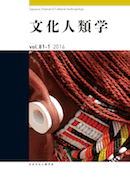Volume 84, Issue 1
Displaying 1-27 of 27 articles from this issue
- |<
- <
- 1
- >
- >|
front matter
-
2019Volume 84Issue 1 Pages f1-
Published: 2019
Released on J-STAGE: September 04, 2019
Download PDF (991K) -
2019Volume 84Issue 1 Pages f2-
Published: 2019
Released on J-STAGE: September 04, 2019
Download PDF (3321K) -
2019Volume 84Issue 1 Pages 001-002
Published: 2019
Released on J-STAGE: September 04, 2019
Download PDF (164K) -
2019Volume 84Issue 1 Pages 003
Published: 2019
Released on J-STAGE: September 04, 2019
Download PDF (920K) -
2019Volume 84Issue 1 Pages 004
Published: 2019
Released on J-STAGE: September 04, 2019
Download PDF (914K)
Special Theme: The Anthropology of the State and Governance
-
2019Volume 84Issue 1 Pages 005-018
Published: 2019
Released on J-STAGE: September 04, 2019
Download PDF (1155K) -
2019Volume 84Issue 1 Pages 019-038
Published: 2019
Released on J-STAGE: September 04, 2019
Download PDF (1323K) -
2019Volume 84Issue 1 Pages 039-057
Published: 2019
Released on J-STAGE: September 04, 2019
Download PDF (1284K) -
2019Volume 84Issue 1 Pages 058-077
Published: 2019
Released on J-STAGE: September 04, 2019
Download PDF (1245K) -
2019Volume 84Issue 1 Pages 078-093
Published: 2019
Released on J-STAGE: September 04, 2019
Download PDF (1592K)
Correspondence
-
2019Volume 84Issue 1 Pages 094-096
Published: 2019
Released on J-STAGE: September 04, 2019
Download PDF (1027K)
Book Reviews
-
2019Volume 84Issue 1 Pages 097-099
Published: 2019
Released on J-STAGE: September 04, 2019
Download PDF (1004K) -
2019Volume 84Issue 1 Pages 099-102
Published: 2019
Released on J-STAGE: September 04, 2019
Download PDF (1013K) -
2019Volume 84Issue 1 Pages 102-105
Published: 2019
Released on J-STAGE: September 04, 2019
Download PDF (958K) -
2019Volume 84Issue 1 Pages 105-107
Published: 2019
Released on J-STAGE: September 04, 2019
Download PDF (947K) -
2019Volume 84Issue 1 Pages 107-110
Published: 2019
Released on J-STAGE: September 04, 2019
Download PDF (1016K) -
2019Volume 84Issue 1 Pages 110-112
Published: 2019
Released on J-STAGE: September 04, 2019
Download PDF (1003K) -
2019Volume 84Issue 1 Pages 112-114
Published: 2019
Released on J-STAGE: September 04, 2019
Download PDF (1003K) -
2019Volume 84Issue 1 Pages 114-117
Published: 2019
Released on J-STAGE: September 04, 2019
Download PDF (1016K) -
2019Volume 84Issue 1 Pages 117-120
Published: 2019
Released on J-STAGE: September 04, 2019
Download PDF (956K) -
2019Volume 84Issue 1 Pages 120-122
Published: 2019
Released on J-STAGE: September 04, 2019
Download PDF (942K)
Information
-
2019Volume 84Issue 1 Pages 123-124
Published: 2019
Released on J-STAGE: September 04, 2019
Download PDF (850K) -
2019Volume 84Issue 1 Pages 125
Published: 2019
Released on J-STAGE: September 04, 2019
Download PDF (848K) -
2019Volume 84Issue 1 Pages 126-127
Published: 2019
Released on J-STAGE: September 04, 2019
Download PDF (842K) -
2019Volume 84Issue 1 Pages 128-129
Published: 2019
Released on J-STAGE: September 04, 2019
Download PDF (864K)
back matter
-
2019Volume 84Issue 1 Pages b1-
Published: 2019
Released on J-STAGE: September 04, 2019
Download PDF (3321K) -
2019Volume 84Issue 1 Pages b2-
Published: 2019
Released on J-STAGE: September 04, 2019
Download PDF (991K)
- |<
- <
- 1
- >
- >|
